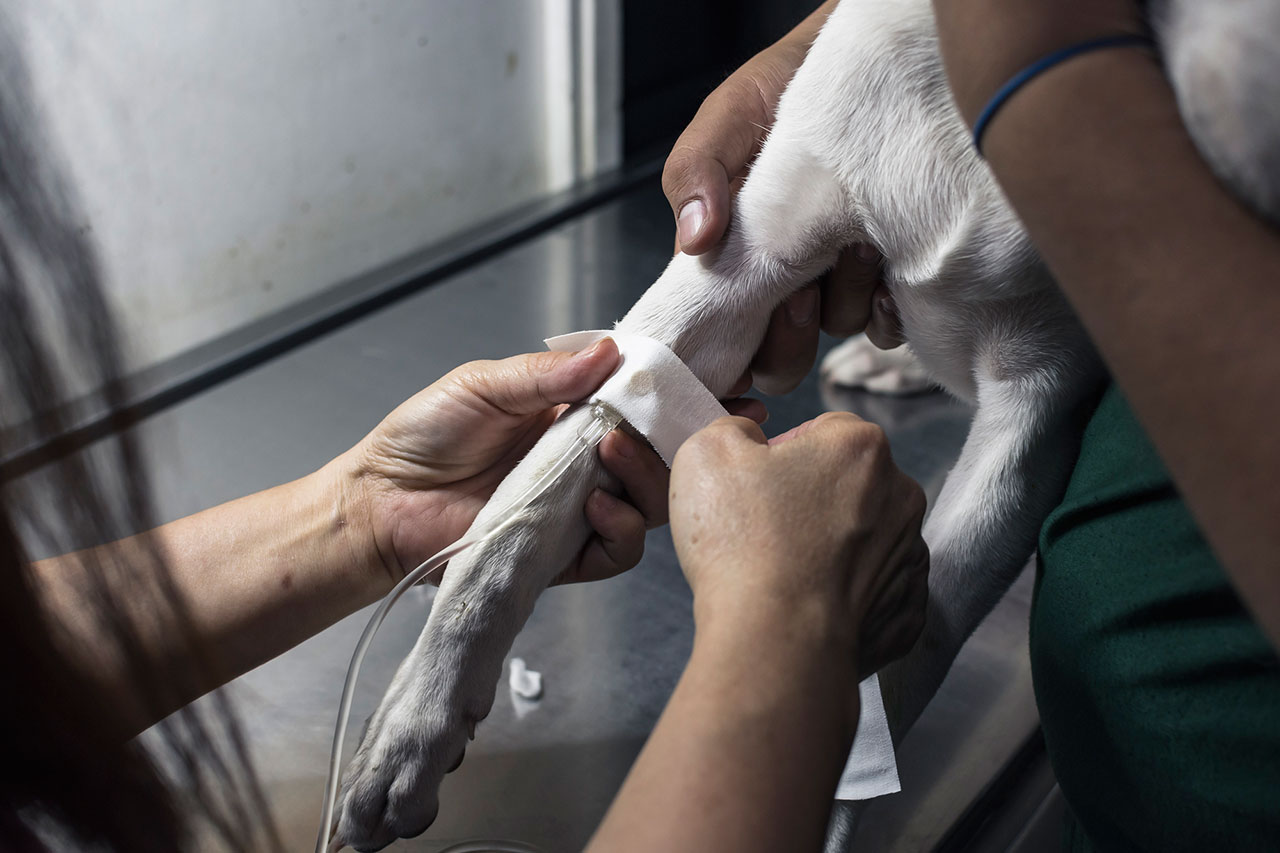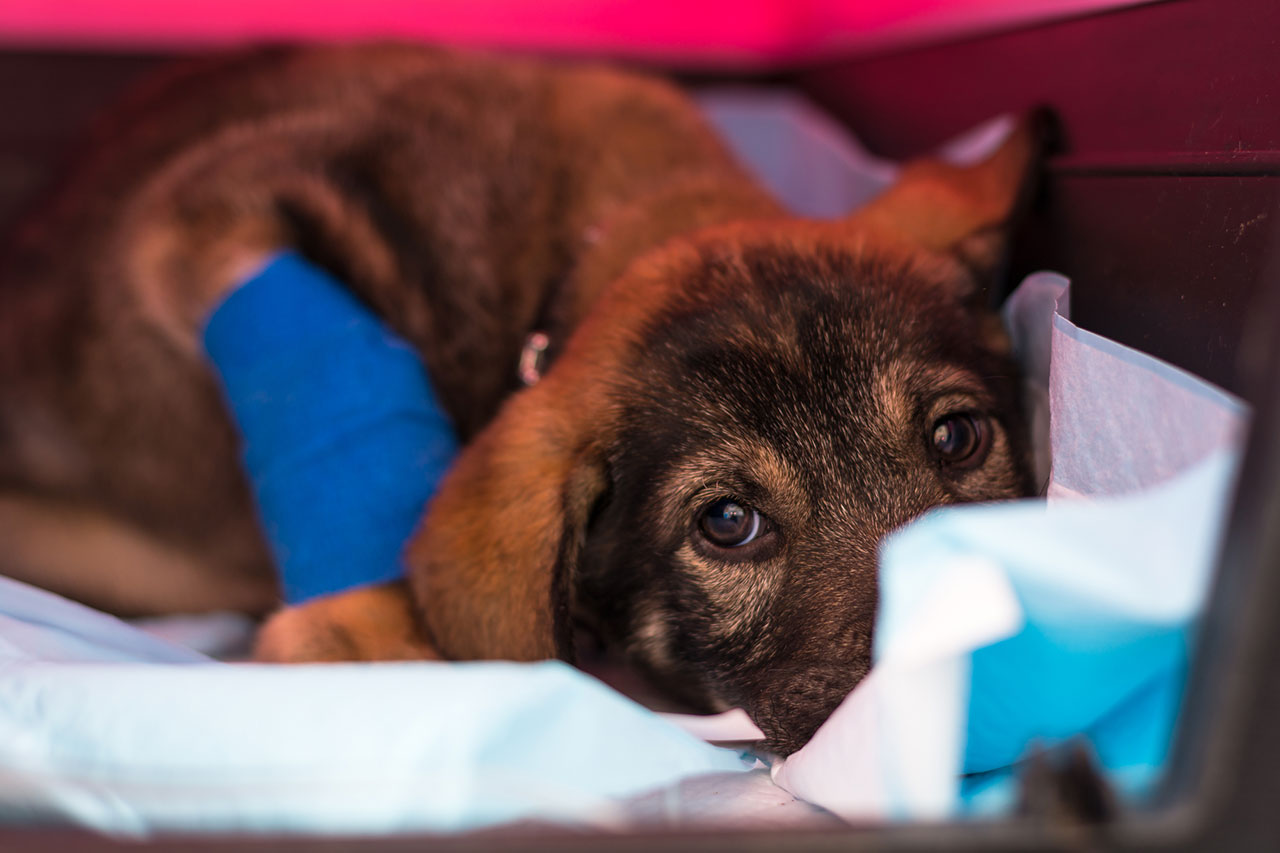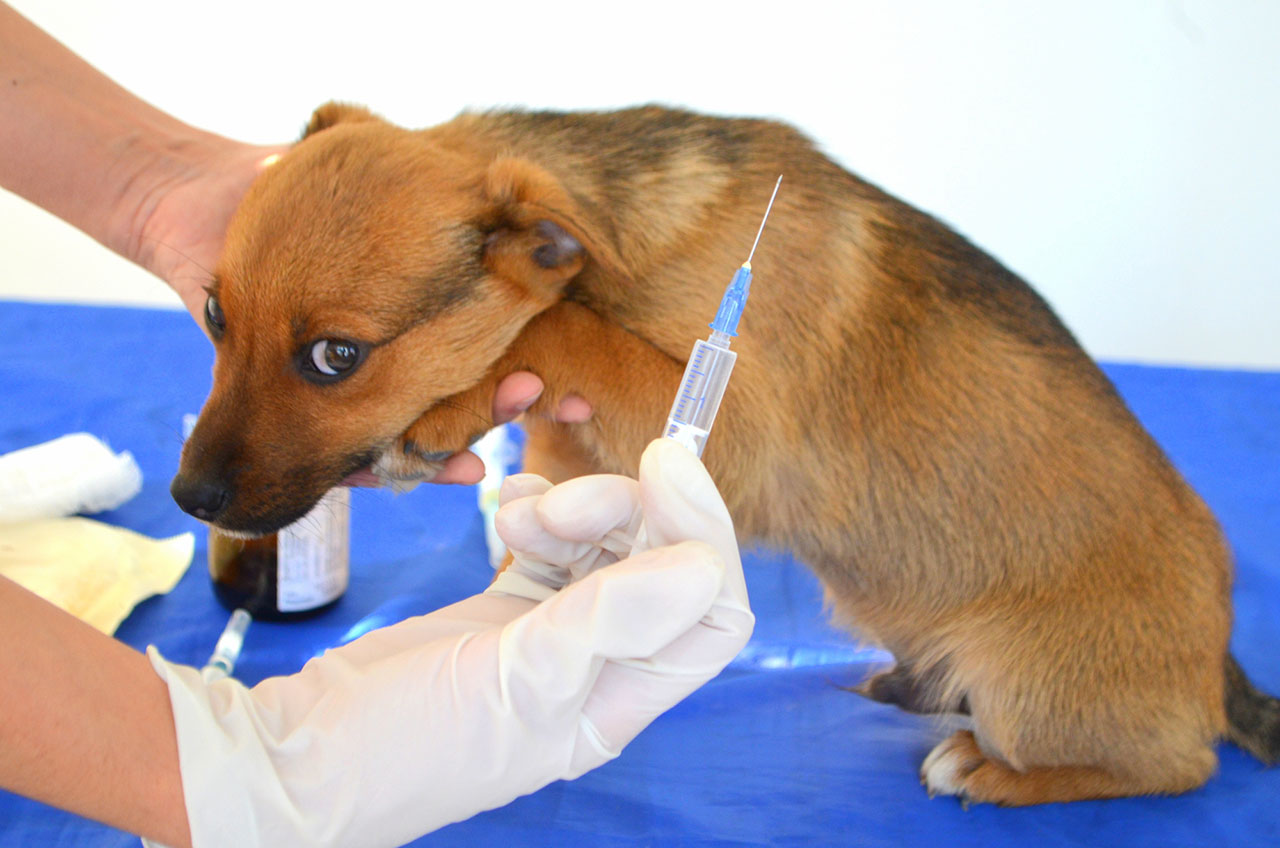How Do I Know if My Puppy Will Survive Parvo?
You love your new puppy, but you’re worried about the possibility of them getting sick with parvo. But we want to assure you that your puppy has a good chance of recovering if they’re treated for parvo early on.
If caught early and treated with antibiotics and fluids, the chances of survival from parvovirus are high. However, if the virus did not see early or if the treatment did not receive, the chances of survival might drop significantly. You surely don’t want your pup to experience that, but with prompt treatment, most puppies will recover from parvo and lead healthy lives. If you haven’t taken your puppy to the vet we highly recommend you drop what you’re doing right now and consult your vet.
What is Parvo, and What Are the Symptoms In Puppies?
Parvovirus is a type of virus that is highly contagious and affects dogs whether they are young puppies or adult dogs. It is often fatal, and there is no cure. It is transmitted through direct contact with the feces of an infected dog, resulting in secondary infections. Canine parvovirus infection can also be transferred through contact with contaminated surfaces or objects. Parvovirus is most commonly seen in young puppies who are weeks of age and even adult dogs. This deadly disease attacks the lining of the intestines and causes severe vomiting and diarrhea.
This deadly virus can affect dogs and puppies and should be taken seriously if you think your pet may have contracted it. First signs of it can vary. So, if you believe that your dog have these common signs, contact your veterinarian immediately to provide veterinary care.
- Vomiting: One of the most common symptoms of parvo is vomiting. This may be accompanied by diarrhea, but not always. If your pet is vomiting, especially if they are also acting lethargic and have no appetite, it’s essential to contact your vet immediately.
- Diarrhea: Diarrhea is another common symptom and may be bloody. Bloody diarrhea is a severe symptom and needs to be treated immediately.
- Loss of Appetite: If your pet has no interest in food or water, it’s a cause for concern.
- Extreme Lethargy: If your pet is usually active and playful but is now listless and uninterested in anything, it could signify parvo.
- Fever: A fever may accompany any or all of the above symptoms. If your furry friend has a temperature of over 103 degrees Fahrenheit, seek medical attention right away.
- Painful Abdomen: Parvo can cause inflammation of the intestines, resulting to abdominal pain. If your furry friend seems to be in pain when you touch its stomach, you should take them to a vet.
- Bloating: Another symptom of intestinal inflammation is bloating. If your pet’s abdomen appears swollen or distended, it could affect their small intestines and signify parvo.
- Severe dehydration: This is a severe symptom and can lead to death if not treated promptly. If your pet is not urinating or producing tears, or if their gums are dry or sticky, they are likely dehydrated and need to see a vet immediately to provide right treatment.
- Weight Loss: If your pet loses weight quickly, it could signify parvo virus.
- Seizures: In severe cases, parvo can cause seizures. This is a medical emergency, and your pet needs to see a vet immediately.
Things You Should Do if Your Dog Contracts Parvo
Parvovirus is a highly contagious virus that can easily wipe out an entire dog population, so you must be prepared if your pup contracts it. Here are the ten things you should do if your dog has parvo:
- Isolate your dog from other dogs immediately. This will help prevent the spread of the virus and give your dog the best chance of recovering. Make sure that the incubation period is enough before you allow them to be with the other dogs.
- Take your furry friend to the vet as soon as possible as they can provide professional treatment and lessen the severity of the case. Parvo is a severe virus and can be fatal if not treated promptly and correctly.
- Follow your vet’s instructions in the letter. It’s a good idea to help your dog for their complete recovery and ensure the virus will not spread.
- Keep your dog hydrated. Parvo can cause vomiting and severe diarrhea, which can lead to dehydration. Make sure to give your dog plenty of fresh water and fluids prescribed by your vet.
- Feed your dog small, frequent meals. Again, due to the vomiting and diarrhea, it’s essential not to overload your dog’s stomach but to keep them fueled with small, easy-to-digest meals. It can help them gradually digest their food without overloading their stomach.
- Keep your dog away from other dogs, don’t bring them to dog parks until they fully recover. Even after completing treatment, your dog will still be contagious. Therefore, keeping them away from other dogs might help to prevent the spread of the virus. So, it’s important to isolate them until they are no longer infected.
- Thoroughly clean and disinfect anything your dog has come into contact with. This includes their bedding, toys, food and water bowls, and anything else they may have been in contact with.
- Wash your own hands thoroughly and often. It can prevent the spread of the virus to you or other members of your household.
- Be prepared for a long road to recovery. Parvo is a serious virus; recovery can take weeks or even months. However, be patient and follow your vet’s instructions; your dog will eventually recover.
- Get vaccinated. Unvaccinated puppy is at high risk, so you need to ensure that your dog is properly vaccinated with booster shot against it. Talk to your trusted vet about the best vaccination schedule for your dog.
Are There Any Treatment Options or Some Home Remedies for Parvo That You Can Try Before Taking Your Pup to the Vet?
Many home treatments can be used to treat this virus. Each remedy is explained in detail with accompanying images where necessary.
- Home remedy one: The first home remedy is to mix honey and water in a 1:1 ratio and give it to your infected puppy orally. This will help to soothe their stomach and stop the vomiting.
- Home remedy two: Another home remedy is to mix some white rice with chicken broth or water and feed it to your dog to help settle their stomach and give them some much-needed energy.
- Home remedy three: If your dog is vomiting, it’s essential to keep them hydrated. You can mix Pedialyte with water and give it to them orally. You can also soak a clean towel in this mixture and let your dog lay on it to help them absorb the fluids.
- Home remedy four: Another home remedy for vomiting is to give your small dog amounts of boiled chicken or turkey. This will provide them with some nutrients and it can boost your puppy’s immune system.
- Home remedy five: For diarrhea, it’s important to start by giving your dog plenty of fluids. This will help to prevent dehydration. You can mix Pedialyte with water or provide them with chicken broth.
- Home remedy six: Another home remedy for diarrhea is to feed your small dog amounts of boiled white rice. This will help to bind their stool and make it less watery.
- Home remedy seven: For dogs with vomiting and diarrhea, giving them small amounts of food and fluids at a time is essential. It will help to prevent further dehydration. For example, you can offer them boiled chicken or turkey, white rice, or cottage cheese mixed with water.
- Home remedy eight: If your dog refuses to eat, you can try tempting them with small amounts of canned food or cooked chicken. This will help to increase their appetite and get them to eat again.
- Home remedy nine: Another home remedy for vomiting dogs is to give them ice chips or ice cubes to suck on. This will help to soothe their stomach and keep them hydrated.
- Home remedy ten: For diarrhea, you can mix a teaspoon of honey with a cup of chamomile tea and give it to your dog orally. This will help to calm their bowels.
- Home remedy eleven: Another home remedy for diarrhea is to mix a teaspoon of pumpkin puree with their food. This will help to firm up their stool and make it less watery.
- Home remedy twelve: For vomiting, you can try giving your dog small amounts of plain yogurt. This will help to soothe their stomach and replenish the good bacteria in their intestines.
- Home remedy thirteen: Another home remedy for vomiting is to give your dog ginger ale or ginger tea. This will stop nausea.
- Home remedy fourteen: For dogs vomiting and diarrhea, mix a teaspoon of honey with a cup of chamomile tea and give it to them orally. This will help to settle their stomach and calm their bowels.
- Home remedy fifteen: For diarrhea, you can mix a teaspoon of pumpkin puree with their food. This will help to firm up their stool and make it less watery.
These are just a few home remedies that can treat vomiting and diarrhea in dogs. However, if your dog is still showing signs of illness, it’s essential to take them to the vet for further treatment.
Are There Any Steps That Can Be Taken to Prevent a Puppy From Getting Sick with Parvo in the First Place?
These ten simple steps can help keep your puppy healthy and safe from parvo.
- Get your puppy vaccinated. It’s essential to ensure that your puppy is up-to-date on all vaccinations, including the parvo vaccine. It will help to protect them from the disease.
- Keep your puppy away from areas where other dogs have been. If you know another dog has had parvo, keep your puppy away from that area. This virus can be spread through contact with contaminated feces, so it’s important to avoid places where infected dogs have been.
- Keep your puppy away from other dogs. If you can, keep your puppy away from other dogs, especially if they are not vaccinated against parvo. It is an effective way to reduce the risk of contracting the disease.
- Keep your puppy away from public places. Parvo is easily spread in areas with a lot of dogs, so it’s best to avoid taking your puppy to places like dog parks or doggy daycares.
- Clean up after your puppy. Ensure to clean up after your puppy whenever they go to the bathroom and dispose of their waste properly. A good hygiene will prevent the spread of this viral infection.
- Wash your hands regularly. Be sure to wash your hands often, especially after contacting your puppy or their waste.
- Disinfect your home. If your puppy has contracted parvo, it’s important to disinfect your entire house to prevent the spread of the disease. You should use a bleach solution to clean all areas where your puppy has been and wash all of his bedding and toys in hot water. It can help to prevent the spread of infection.
- Keep your puppy hydrated. Parvo can cause dehydration, so it’s essential to make sure that your puppy is getting enough fluids. Offer them plenty of water to drink, and if they cannot keep down water, give them a Pedialyte or an electrolyte solution.
- Feed your puppy a bland diet. If your puppy is sick with parvo, it may not have much appetite. Feed them small meals of a bland diet, such as boiled chicken and rice, to help settle their stomach.
- See your veterinarian. If you think your puppy may have parvo, it’s essential to see your veterinarian immediately. Early diagnosis and treatment are crucial in helping puppies recover from this disease.
Parvo is a serious disease, but with the proper care and treatment, your puppy can make a full recovery. Now you know what to anticipate if your puppy gets parvo, as well as how to give them the most outstanding possible care.




